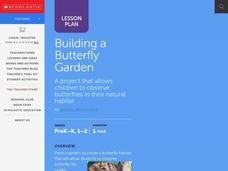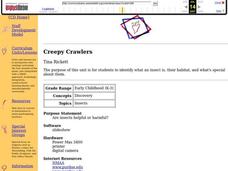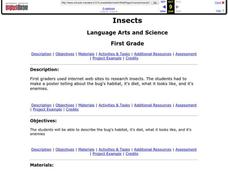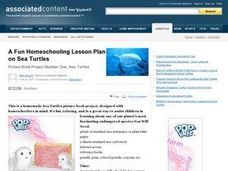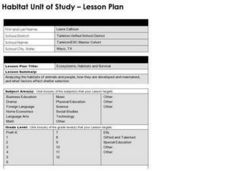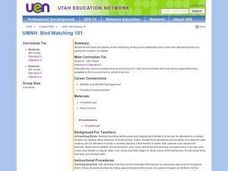Curated OER
Lewis and Clark in Washington Shrub Steppe Habitat
Students examine the land of the shrub steppe and compare it with Lewis and Clark's journals. They list the characteristics of the land. They also discuss restoration of native plants.
Curated OER
Sharks
Students research sharks, the food chain, and the water habitat shared by humans and sharks.
Curated OER
Stormy Weather
Fifth graders compare human and wildlife environments. In this stormy weather lesson, 5th graders imagine they are an animal or human during a storm. Students compose a story with comparisons and reasons for how an organism's habitat...
Curated OER
Wild Animal Science
Students discover how environmental factors impact the survival of a population. For this landscape design lesson, students create a new animal and discuss the relationship between the animal and its environment before creating a habitat...
Curated OER
Building a Butterfly Garden
Students plant a garden which will become the habitat for butterflies as they go through their life cycle. In this life cycle lesson, students grow plants that attract butterflies and feed caterpillars in order to observe the entire...
Curated OER
Biodiversity in Illinois-Pond Habitats
Second graders construct a pond habitat in the classroom using a small swimming pool partially filled with water, real cattails, a tree log adjoining, and plastic animal life appropriate to a pond setting. They examine the frog in detail...
Curated OER
"Oh Deer!"
Students play a game where half of them are deer and the others are components of habitat: food, water, shelter and space. They signify their needs by hand gestures and take what they need to their side of the game. They discuss real...
Curated OER
Citizens For the New Zoo
Third graders complete Internet research to find information about an animal and its basic needs. They design a model of a zoo habitat that would accommodate their animal. They write a letter of recommendation to a Zoo board of directors...
Curated OER
Habitats of the World
Students complete a unit of eighteen lessons that cover climate, geography, location, plants, and animals of each of the five habitats. They are also introduced to habitat destruction and discuss ways to protect the environment. They do...
Curated OER
Creepy Crawlers
Students identify the characteristics of an insect and their habitat. They read books about insects, research different types of insects, and create their own insect art. The project also includes the creation of an insect song and...
Curated OER
Lake and Pond Study
Learners examine the habitat and community structure of a pond that could support Ospreys through games and worksheets. They then go on a field trip to a pond to evaluate the suitability of the pond as an Osprey habitat.
Curated OER
Animal Homes
Children visit one particular website to explore animals that live in different habitats. After visiting the website, they choose to research one habitat and the animals that live there. They create a poster about their animal and where...
Curated OER
Hide and Seek
Students explore animal characteristics by creating a poster presentation in class. In this animal habitat lesson, students visit the local zoo and identify which habitats certain animals are most comfortable in. Students answer study...
Curated OER
Insects
First graders view internet web sites, books and printed sources to research insects. They make a poster telling about the bug's habitat, it's diet, what it looks like, and it's enemies.
Curated OER
Rainforests: What Are They?
Second graders investigate rain forests by reading a habitat checklist. In this environment lesson, 2nd graders read the book The Great Kapok Tree, and discuss what characteristics make up a rain forest. Students explore a habitat...
Curated OER
Animals in Inspiration
Students research information on a specific animal. In this animal lesson plan, students use books to find information about an animals diet, habitat, appearance, and any other interesting facts. Students will use this information to...
Curated OER
Homeschooling Lesson: Sea Turtles
Students write down the names of common turtles and observe pictures of various types. In this sea turtles activity, students review names and features of these animals, label and draw a picture. Students research habitat, migration,...
Curated OER
Move To a Healthier Aquatic Balance
Fourth graders examine aquatic orgnaisms and how enviromental chages affect them. This factors include: temperature, Ph, oxygen, nutrients, and pollutants. They also explore habitat quality (erosion). Students compile data and create...
Curated OER
Book Making
Students make connections with real life experiences and the two languages, including Spanish and English. They create their own books in this project lesson plan to take home and read with their families. Students also use a digital...
Curated OER
Ecosystems, Habitats and Survival
Students analyze the habitats of animals and people, how they are developed and maintained, and what factors affect shelter selection. They create a classified ad that describes a specific animal's habitat.
Curated OER
Exploring the Beach
Students explore the beach. In this marine habitat instructional activity, students inspect sand grains, design beach profiles, classify marine life, and examine natural beach habitats. Students use spreadsheets to record data from their...
Curated OER
Interesting Insects
Students discover the characteristics of insects. They explore insects through cooperative learning, group projects, hands on activities, and poetry. They gain knowledge of insect life cycles, habitat, and physical characteristics.
Curated OER
Frogs and Camouflage
Students view a variety of pictures of frogs and discuss camouflage and habitat adaptation. Students look at color, skin texture, shape, size, eyes, and surroundings as well as the need for the camouflage. Students then design a frog...
Curated OER
Bird Watching 101
Fourth graders examine the basics of bird watching, finding and interpreting bird clues and attracting birds to a particular location or habitat. They go on a birding hike after a lecture on what to look and listen for in the woods.






